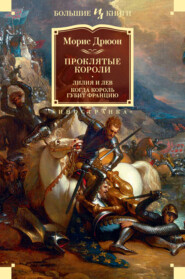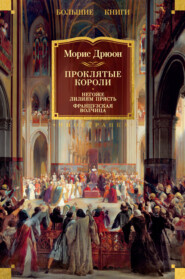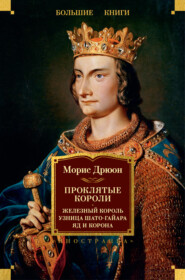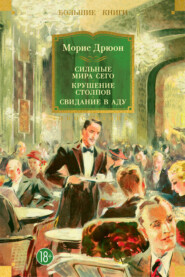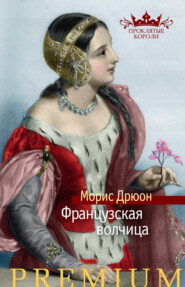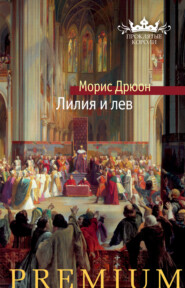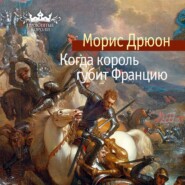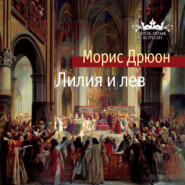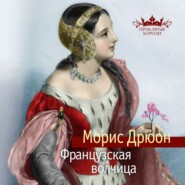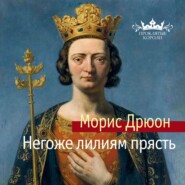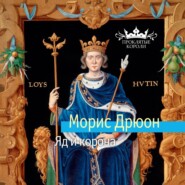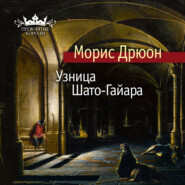По всем вопросам обращайтесь на: info@litportal.ru
(©) 2003-2024.
✖
The Iron King
Автор
Год написания книги
2019
Настройки чтения
Размер шрифта
Высота строк
Поля
The heavy door creaked open and, behind the gaoler, Molay saw four archers dressed in leather tunics and carrying pikes. Their breath spread out in a thin cloud before their faces.
Their chief said, ‘We have come to fetch you, Messire.’
Molay rose silently to his feet.
The gaoler came forward and with cold chisel and heavy blows of a hammer broke the rivet that fastened the chain to the heavy iron anklets. Each weighed four pounds.
He clasped his great, illustrious mantle, now no more than a grey rag, its black cross in tatters at the breast, about his emaciated shoulders.
They left the dungeon. And in that reeling exhausted old man, his feet weighed down with fetters as he mounted the tower’s steps, there could still be seen something of the commander who had recaptured Jerusalem from the Saracens for the last time.
‘Oh, Lord my God,’ he murmured to himself, ‘give me strength, give me a little strength.’ And to help himself find it, he repeated the names of his three enemies: Clement, Guillaume, Philip.
Fog lay thick upon the huge court of the Temple, cloaked the turrets of the enclosing wall, flowed through the crenellations, and obscured the spire of the great church on the right of the tower.
A hundred soldiers were standing at ease, talking quietly among themselves, as they stood round a big, square, uncovered wagon.
From beyond the walls he could hear the murmur of Paris and the occasional neigh of a horse, sounds that moved him with an ineffable sadness.
Messire Alain de Pareilles, Captain of the King’s Archers, the man who attended every execution, who accompanied the condemned to sentence and torture, was walking up and down the centre of the yard, his face impassive, his expression bored. He was forty years old and his steel-coloured hair fell in a short fringe across his square forehead. He wore a coat of mail, had a sword at his side, and carried his helmet in the crook of his arm.
He turned as he heard the Grand Master’s approach, and the latter, seeing him, turned pale, if it were possible for his pallor to increase.
Merely for interrogations there was not, as a rule, so much display; there were neither wagon nor men-at-arms. A few royal agents came to escort the accused, generally at nightfall, by boat across the Seine.
The presence of Alain de Pareilles was alone significant enough.
‘Has judgment been pronounced?’ Molay asked the Captain of the Archers.
‘It has, Messire,’ he replied.
‘And do you know, my son,’ Molay asked after a moment’s hesitation, ‘what that judgment contains.’
‘I do not, Messire. My orders are to conduct you to Notre-Dame to hear it read.’
There was a silence, then Jacques de Molay asked, ‘What day is it?’
‘The Monday after the feast of Saint Gregory.’
This corresponded to the 18th March, the 18th March 1314.
‘Am I being taken out to die?’ Molay wondered.
The door of the tower opened again, and three other dignitaries appeared in their turn, escorted by guards, the Visitor General, the Preceptor of Normandy and the Commander of Aquitaine.
They had white hair, and white unkempt beards, their deep-sunken eyes blinked in the light, their bodies seemed to float in their ragged mantles; for a moment they stood still, like great night-birds unable to see in the light. Moreover, the Commander of Aquitaine had a white film over his left eye which gave him something of the appearance of an owl. He seemed completely stupefied. The semi-bald Visitor General had horribly swollen hands and feet.
It was Geoffroy de Charnay, the Preceptor of Normandy, who first, though hampered by his irons, rushed up to the Grand Master and embraced him. There was a long friendship between the two men. Indeed, it was Jacques de Molay who had helped Charnay in his career. Ten years younger than himself, he had looked upon Charnay as his successor.
Charnay’s forehead was furrowed by a deep scar, the legacy of an old battle in which a sword-cut had also given him a crooked nose. This rugged man, his face marked by war, leant his forehead against the Grand Master’s shoulder to hide his tears.
‘Have courage, Brother, have courage,’ said the Grand Master, clasping him in his arms. ‘And you, too, my Brothers, have courage,’ he went on, embracing the other dignitaries in turn.
Seeing each other, they were able to judge of their own appearance.
A gaoler came up.
‘You have the right to have your irons removed, Messires,’ he said.
The Grand Master spread wide his arms in a bitter, hopeless gesture.
‘I have not the money,’ he replied.
For each time they left their prison, in order to have their irons removed and replaced, the Templars had to pay a denier out of the dozen they were allowed for their wretched food, the straw in their dungeons and the laundering of their single shirt. Another of Nogaret’s subtle cruelties! They were accused, but not condemned. They had the right to a maintenance allowance. What was the use of twelve deniers, when a small joint of meat cost forty? It meant starving four days in eight, sleeping on the hard stone, rotting in squalor.
The Preceptor of Normandy took the last two deniers from the old leather purse attached to his belt and threw them on the ground, one for his own irons and one for those of the Grand Master.
‘My Brother!’ said Jacques de Molay with a gesture of refusal.
‘For all the use they are likely to be to me now,’ replied Charnay. ‘Accept them, Brother; there is not even merit in the giving.’
As the iron pins were removed, they felt the hammer-blows resounding in their bones. But they felt the blood pounding in their chests more strongly still.
‘This time, we’ve come to the end,’ Molay murmured.
They wondered what kind of death had been reserved for them, whether they would be subjected to ultimate tortures.
‘It is perhaps a good sign that our irons are being removed,’ said the Visitor General, shaking his swollen hands. ‘Perhaps the Pope has decided upon clemency.’
There were still a few broken teeth in the front of his mouth and these made him lisp, while the dungeon had turned his mind childish.
The Grand Master shrugged his shoulders and pointed to the phalanx of a hundred archers.
‘We must prepare to die, Brother,’ he said.
‘Look, look what they have done to me,’ cried the Visitor, pulling up his sleeve to show his swollen arm.
‘We have all been tortured,’ said the Grand Master.
He looked away, as he always did when someone spoke of torture. He had yielded, he had signed false confessions and could not forgive himself.
He looked round upon the huge group of buildings which had been the seat and symbol of their power.
‘For the last time,’ he thought.
For the last time he gazed upon the vast assembly of tower and church, palace and houses, courts and gardens, a fortified town within Paris itself.
Here it was that for two centuries the Templars had lived, prayed, slept, given judgment, transacted business, and decided upon their expeditions to distant lands. In this very tower the treasure of the Kingdom of France had been deposited, confided to their care and guardianship.






